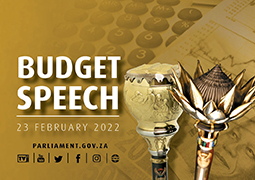
Minister of Finance Mr Enoch Godongwana told the National Assembly that more than R308 billion has been used to bail out failing state-owned enterprises, leading to a reduction of R257 billion in public funds available for frontline services and infrastructure.
“In this Budget, we are shifting from this trend and restoring our focus on the core functions of government. We are also on course to close key fiscal imbalances and restore the health of public finances,” he said.
However, the debt burden remains a matter of serious concern. This year, government debt has reached R4.3 trillion and is projected to rise to R5.4 trillion over the medium-term. This incurs large debt-service costs; averaging R330 billion annually over the MTEF. He said these costs are larger than spending on health, policing or basic education. “For this reason and to support the economic recovery, in this budget we are reducing the fiscal deficit and stabilising debt. The consolidated budget deficit is projected to narrow from 5.7 per cent of GDP in 2021/22, to 4.2 per cent of GDP by 2024/25.”
The debt ratio will stabilise at 75.1 per cent of GDP by 2024/25 and is three percentage points lower than projected in the Medium Term Budget Policy Statement. It is also the first time since 2015 that the government is reducing the borrowing requirement, using some of the extra revenue they have collected, by R135.8 billion this year and a total of R131.5 billion over the next two years.
Though the fiscal outlook has improved, it is still subject to significant risks, which include:
Slowing global and domestic economic growth;
Calls for a permanent increase in social protection that exceed available resources.
Pressures from the public‐service wage bill; and
Continued requests for financial support from financially distressed state‐owned companies.
“We need to stay vigilant and mitigate the risks where possible. In the upcoming period, we will do more work to strengthen fiscal anchors. We will also reduce the continual demands on South Africa’s limited public resources from state-owned companies,” he added.
For this reason, state-owned-companies must develop and implement sustainable turnaround plans and their future is under consideration by the Presidential State-Owned Enterprises Council. This council will assess the value they create and whether they can be run as sustainable entities without bailouts from the fiscus. Some of them will be retained, while others will be rationalised or consolidated.
The National Treasury will also outline the criteria state‐owned companies must meet to qualify for state funding in the upcoming financial year. “We are aware that Eskom’s debt situation remains a concern for its creditors and our investors alike. Government continues to support Eskom to remain financially sustainable during its transition.”
To date, Eskom has received R136 billion to pay off its debt, with a further R88 billion until 2025/26. “We acknowledge, however, that Eskom is faced with a large amount of debt that remains a challenge to service without assistance,” he continued. The National Treasury is working on a sustainable solution to deal with Eskom’s debt in a manner that is equitable and fair to all stakeholders.
“Any solution will be contingent on continued progress to reform South Africa’s electricity sector and Eskom’s own progress on its turnaround plan and its restructuring. We expect Eskom to take further steps towards cost containment, conclude the sale of assets and implement operational improvements to enhance the reliability of electricity supply.”
Mava Lukani
25 February 2022

